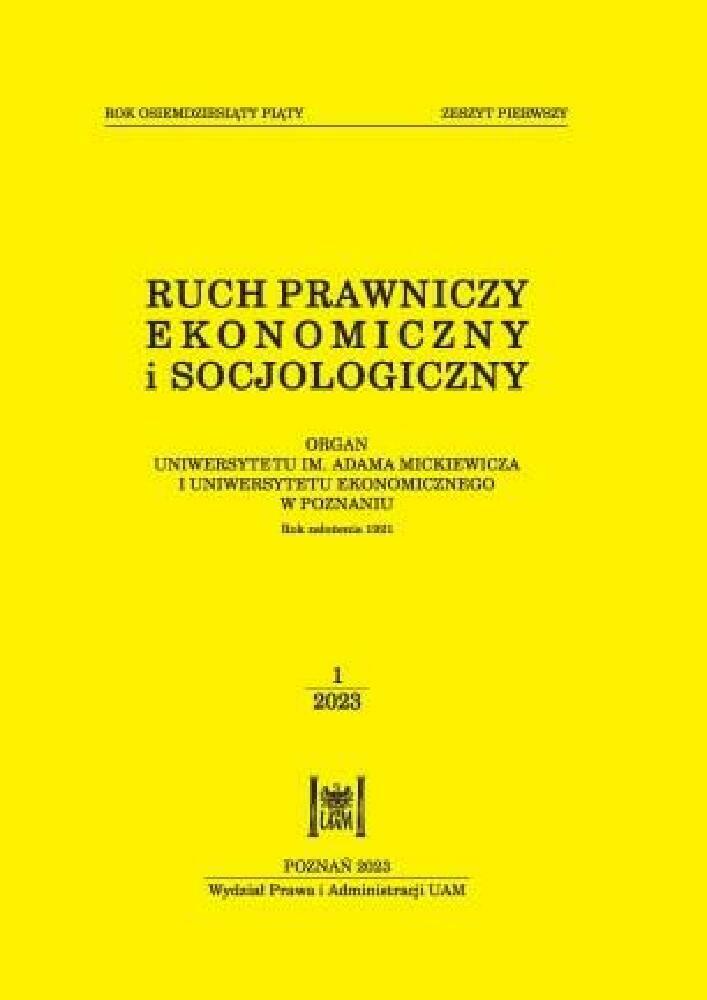Abstrakt
This paper aims to present the size and structure of passive income payments, such as dividends, interest, royalty payments, and fees for intangible services, made by companies domiciled in Poland belonging to a multinational enterprises (MNE) group. The authors formulate a hypothesis that tax jurisdictions offering extensive legal and tax incentives for holding structures, in particular concerning the tax treatment of dividends and other withholding tax payments, are the preferred location of holding companies. A review of the literature and legal sources precedes empirical research. The empirical analysis shows that passive income flows, including dividends, interest, royalties, and fees for intangible services, which constitute the dominant type of payments to holding companies, are directed from Poland primarily to countries with tax and regulatory solutions that are friendly to holding companies, including in particular the so-called intra-EU tax havens, namely Luxembourg, Cyprus, the Netherlands, Malta and Ireland. Real trade with these countries is neither significant nor proportional to the scale of passive income.
Bibliografia
Aleksander, A., de Vito, A., Jacob, M. (2020). Corporate tax reforms and tax-motivated profit shifting: evidence from the EU. Accounting and Business Research 50(4): 309–341. DOI: https://doi.org/10.1080/00014788.2020.1712649
Albertus, J.F., Glover, B., Levine, O. (2021). Foreign investment of US multinationals: The effect of tax policy and agency conflicts. Journal of Financial Economics 144(1): 298–327. DOI: https://doi.org/10.1016/j.jfineco.2021.06.004
Bernaś, B. (2006). Finanse międzynarodowe. Warsaw.
Buettner, T., Overesch, M., Wamser G. (2018). Anti profit-shifting rules and foreign direct investment. International Tax Public Finance 25: 553–580. DOI: https://doi.org/10.1007/s10797-017-9457-0
Cárdenas, G.C., Gamez, S.G. (2015). The influence of the tax system on the location of holding companies in Switzerland. Competitiveness Review 25(2): 218–237. DOI: https://doi.org/10.1108/CR-08-2014-0022
Chen, N.X., Lehmer, T. (2021). Aggressive Tax Avoiders: U.S. Multinationals Shifting Domestic Earnings to Zero. The Accounting Review 96(5): 181–206. DOI: https://doi.org/10.2308/TAR-2018-0419
Clifford, S. (2019). Taxing multinationals beyond borders: financial and locational responses to CFC rules. Journal of Public Economics 173(C): 44–71. DOI: https://doi.org/10.1016/j.jpubeco.2019.01.010
Delis, M.D., Hasan, I., Karavitis, P.I. (2020). Profit shifting and tax-rate uncertainty. JBFA 47: 645–676. DOI: https://doi.org/10.1111/jbfa.12429
Gajewski, D. (2005). Opodatkowanie holdingów i grup kapitałowych. Warsaw.
Gajewski, D. (2016). Nowoczesne holdingowe prawo podatkowe jako forma przeciwdziałania międzynarodowemu unikaniu opodatkowania. In H. Dzwonkowski, J. Kulicki (eds.), Dylematy reformy systemu podatkowego w Polsce. Prace Studialne 1(4): 465–477.
Goldbach, S., Møen, J., Schindler, D., Schjelderup, G., Wamser, G. (2021). The tax-efficient use of debt in multinational corporations. Journal of Corporate Finance 71: 102119. DOI: https://doi.org/10.1016/j.jcorpfin.2021.102119
Główny Urząd Statystyczny (2019). Obroty towarowe handlu zagranicznego ogółem i według krajów w okresie styczeń – grudzień 2018 (dane tymczasowe). Warsaw.
Hopland, A. O., Lisowsky, P., Mardan, M., Schindler, D. (2018). Flexibility in income shifting under losses. Accounting Review 93(3): 163–183. DOI: https://doi.org/10.2308/accr-51907
Jamroży, M. (2016). Opodatkowanie dochodów transgranicznych. Warsaw.
Jamroży, M., Sarnowski, J., Tonia, A. (2021). Obrót dobrami niematerialnymi a ceny transferowe. Doradztwo Podatkowe – Biuletyn Instytutu Studiów Podatkowych 12: 86–92. DOI: https://doi.org/10.5604/01.3001.0015.6373
Janský, P., Palanský, M. (2019). Estimating the scale of profit shifting and tax revenue losses related to foreign direct investment. International Tax and Public Finance 26(5): 1048–1103. DOI: https://doi.org/10.1007/s10797-019-09547-8
Li, Q., Ma, M., Shevlin, T. (2021). The effect of tax avoidance crackdown on corporate innovation. Journal of Accounting and Economics 71(2): 101382. DOI: https://doi.org/10.1016/j.jacceco.2020.101382
Littlewood, M., Elliffe, C. (2017). Capital Gains Taxation: A Comparative Analysis of Key Issues. Auckland. DOI: https://doi.org/10.4337/9781784716028
Litwińczuk, H. (1995). Opodatkowanie koncernów. Rozwiązania w państwach Unii Europejskiej. Przegląd Podatkowy 3: 18–23.
Majdowski, F. (2014). Konsekwencje cash-poolingu w najnowszych interpretacjach organów podatkowych. Przegląd Podatkowy 6: 24–33.
Maners, T.S. (1988). Introduction to Corporate Finance. Paperback – International Edition. New York.
Mioduchowska-Jaroszewicz, E. (2011). Źródła finansowania działalności w grupie kapitałowej. Studia i Prace Wydziału Nauk Ekonomicznych i Zarządzania 21: 153–164.
Pyzio, K. (2015). Odpowiedzialność spółki dominującej względem wierzycieli kapitałowych spółek zależnych. Warsaw.
Rudowski, J. (2019). Wstęp. In D. Gajewski (ed.), Ceny transferowe. Wybrane zagadnienia (pp. 13–17). Warsaw.
Sekita, J. (2017). Rozliczanie podatku u źródła. Warsaw.
Szumielewicz, W. (2004). Zarządzanie skarbem w grupie kapitałowej. In B. Nogalski, P. Walentynowicz (eds.), Zarządzanie w grupach kapitałowych. Aspekty organizacyjne, finansowe, właścicielskie i personalne (pp. 213–237). Gdynia.
Toborek-Mazur, J. (2005). Holding w aspekcie prawnym, bilansowym i podatkowym. Kraków.
Tørsløv, T., Wier, L., Zucman, G. (2021). The Missing Profits of Nations. Working Paper. https://gabriel-zucman.eu/files/TWZ2021.pdf DOI: https://doi.org/10.1093/restud/rdac049
Van Dijk, M., Weyzig, F., Murphy, R. (2006). The Netherlands: A Tax Haven? Amsterdam. DOI: https://doi.org/10.2139/ssrn.1660372
Van‘t Riet, M., Lejour, A. (2018). Optimal tax routing: network analysis of FDI diversion. International Tax Public Finance 25: 1321–1371. DOI: https://doi.org/10.1007/s10797-018-9491-6
Vlachy, J. (2008). Investigating a thin-capitalization rule: an option-based analysis. Politicka Ekonomie 56(5): 656–668. DOI: https://doi.org/10.18267/j.polek.657
Xing, J. (2018). Territorial tax system reform and multinationals’ foreign cash holdings: new evidence from Japan. Journal of Corporate Finance 49: 252–282. DOI: https://doi.org/10.1016/j.jcorpfin.2018.01.012
Licencja
Prawa autorskie (c) 2023 WPiA UAM

Utwór dostępny jest na licencji Creative Commons Uznanie autorstwa 4.0 Międzynarodowe.





